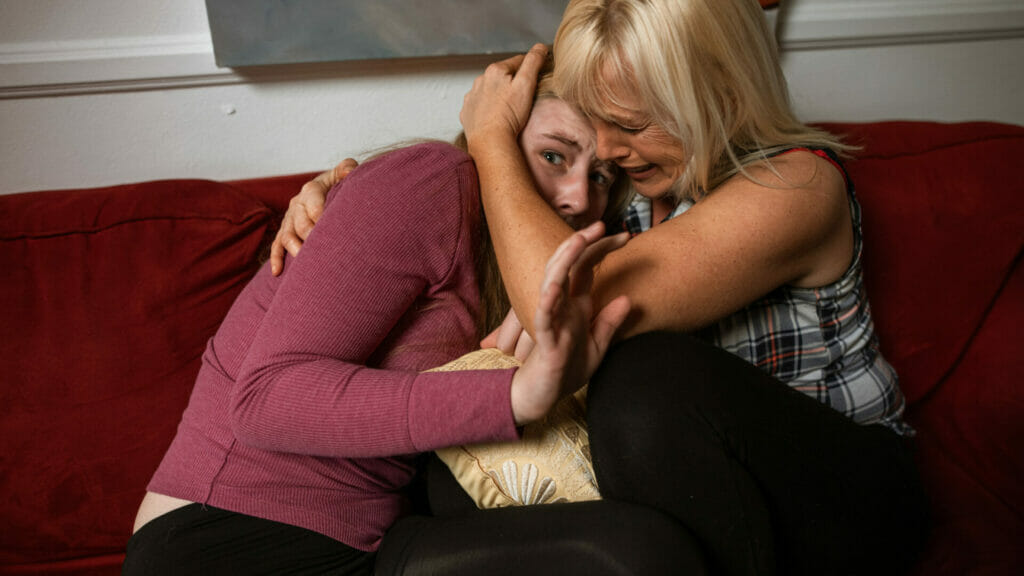Caring for someone with post-traumatic stress disorder (PTSD) from a traumatic event can be a scary tumultuous journey. Watching a loved one endure something only they understand can bring about frustration, helplessness, and wondering “How can I help them?”
Keep reading below to learn what to do and what not to do to someone with PTSD.
What Is PTSD?
Post-traumatic stress disorder is a mental health condition triggered by witnessing or experiencing a horrifying or traumatic event (e.g., sexual abuse, domestic violence, natural disasters, mass shootings, car accident, terrorism, unexpected death of a loved one, etc.).
What Are the Symptoms of PTSD?

Traumatic events may trigger PTSD symptoms, such as:
- Anxiety
- Flashbacks
- Nightmares
- intrusive thoughts
- Avoidance
The symptoms may last months to years and may interfere with daily functioning.
[Read: A Guide To PTSD Symptoms And Causes]
How Can You Help Someone With PTSD?
What to Do and What Not to Do to Someone With Ptsd
DO validate their emotions.
People who have experienced a traumatic experience have emotional responses uniquely their own. Anxiety, fear, sadness, anger, etc. are all unpleasant emotions that can be experienced at any time due to their trauma. It may not be easy to understand why, but what’s most important is to let your loved one know that what they are feeling is valid and that you are here to support them.
DON’T tell them to “Just get over it”.

The worst thing you can do for someone who has PTSD is tell them to “Just get over it.”
PTSD is an ongoing disorder that requires therapy and often medication management to help heal. Even if you have experienced a similar trauma, each person’s response and perspective are uniquely their own. It is important to honor their own unique experience and emotions related to their trauma.
DO create a safe environment to be themselves.

Trauma survivors need a safe, welcoming environment to be themselves wherever they are in their healing process. Create a space that makes them feel comfortable sharing or not sharing. They may not be ready to do the things they once did and that is okay.
Offering space to do things that feel safe and comfortable is the best thing you can offer someone suffering from PTSD.
DON’T pressure them to talk about their traumatic experience.
Understanding where they are coming from may feel like a necessary part of supporting our loved ones suffering from PTSD. However, asking them to retell their traumatic experiences may be difficult and emotionally taxing on the individual.
Allow them to come to you when they are ready to talk about it. Remember that what they share is a privilege to know.
DO help them maintain a loving community.

Those who suffer from PTSD often find themselves withdrawn from people they love and the activities they once loved doing. It’s easy to lose friendships and become isolated from those they love. You can support them by reminding them that they are not alone and they are loved. Check in on them, include them in gatherings, and make them feel welcomed.
DON’T force them to socialize or do things they’re not ready for.
Forcing our loved ones to do things they are not ready for may often cause more damage, and worse, trigger PTSD symptoms. It’s important to continue to include them in activities and allow them to decide what they are up for.
Sometimes, a gathering may look a little different than it did before, but that’s okay. Adapting to what feels comfortable to them will show them that you care about their needs and your relationship with them.
DO allow them to set the pace.
Practicing patience is important to help support someone with PTSD. We may want to heal them and help them feel better as quickly as possible, but sometimes healing requires more time than we would like.
There will be setbacks and there will be times when progress feels slower at times than others. Remember that sometimes it takes one step back to take two steps forward.
DON’T place your own expectations on them.
It may be frustrating when those with PTSD continue to suffer from traumas they experience even years later. We may expect them to be the same person they were before the event or feel enough time has passed to move on.
PTSD can be an ongoing struggle that takes months to even years to heal from. It’s unfair to place your own wants and expectations onto them without acknowledging that the healing process is oftentimes a long, difficult journey, and they are doing their best.
To learn about the diagnosis and treatment for PTSD, read our guide here.
If you or someone you know is suffering from post-traumatic stress disorder, we are here to help you explore your treatment options. Schedule a consultation with our PNS for professional medical advice and treatment.

